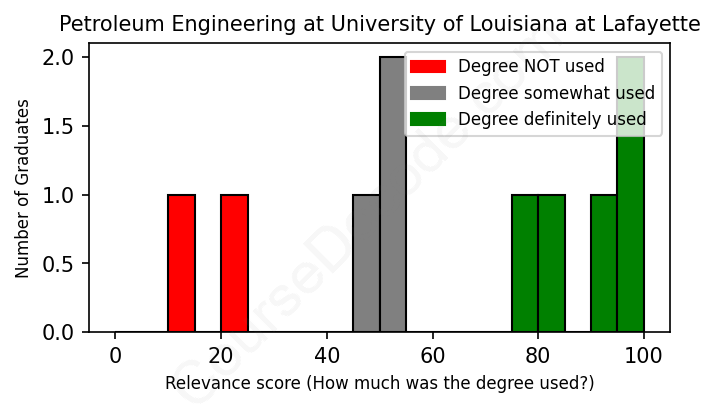
First, some facts. Of the Petroleum Engineering graduates from University of Louisiana at Lafayette we've analyzed , here's how many have used (or NOT used) their degree in their career:

These are estimates based on AI analysis of 10 LinkedIn profiles (see below).
The verdict? Slightly below average. Overall, with an average relevance score of 63%, Petroleum Engineering graduates from University of Louisiana at Lafayette have a slightly lower likelihood (-4%) of finding work in this field compared to the average graduate across all fields:
And for comparison, here's the chart for all profiles we've looked at across all degrees.
Also, after graduating, only 30% of these graduates have pursued further education other than another Bachelor's degree (such as a Masters degree or other), compared to the average across all profiles of 35%. This suggests a Bachelors degree is enough for most Petroleum Engineering graduates, and it's normal to look for work straight after graduation.
See the details:
|
Relevance score: 83% We think this person has gone into a career highly relevant to their degree. We think this person has gone into a career highly relevant to their degree.
DEGREE INFOGraduated in 2014 from University of Louisiana at Lafayette with a Bachelor of Science in Petroleum Engineering. No other secondary education since. JOB HISTORY SINCE GRADUATIONOperations Supervisor Weatherford May 2017 - Jul 2018 Drilling Consultant/Performance Optimization/DSM  JPE Jul 2018 - Jan 2020 Drilling Consultant/Performance Optimization/DSM  Parsley Energy Jan 2020 - Jan 2021 Drilling Consultant  Tap Rock Resources Jan 2021 - Oct 2021 Drilling Engineer  Franklin Mountain Energy, LLC Oct 2021 - Present ABOUTNo information provided. |
The top 10 most common jobs done by the graduates we've analyzed (ranked most common to least) are:
The job landscape for graduates with a Petroleum Engineering degree from the University of Louisiana at Lafayette shows a mix of positions that either directly relate to their field or veer off into other areas. A significant number of alumni have taken roles like Production Engineer, Drilling Consultant, and Field Engineer, which definitely align with their education in petroleum engineering. These positions directly utilize the knowledge and skills they've gained, focusing on essential tasks like drilling operations, well site management, and production optimization. For instance, roles at companies like Halliburton and Weatherford strongly reflect this connection, as they require a firm grasp of engineering principles specific to petroleum extraction and production.
On the flip side, there’s a noticeable trend of graduates landing jobs in data analytics, project management, and even real estate, where their petroleum engineering background doesn't play a central role. Positions like Business Intelligence Analyst and various technical support roles lean more towards data analysis and general engineering management, often lacking the direct application of petroleum-specific skills. This divergence suggests that while many graduates still find relevant jobs in the oil and gas sector, there’s a proportion that ends up in jobs less relevant to their degrees, possibly due to changing market demands or personal interests. Overall, it's a mixed bag, with plenty finding their way into the heart of the industry while others branch out into different domains.
Here is a visual representation of the most common words in job titles for Petroleum Engineering graduates (this is across all Petroleum Engineering graduates we've analyzed, not just those who went to University of Louisiana at Lafayette):

Graduates from the University of Louisiana at Lafayette with a degree in Petroleum Engineering generally start off their careers in roles directly related to the oil and gas industry, such as field engineers and consulting petroleum engineers. Many of these first jobs seem to involve hands-on work in drilling, production engineering, or as part of consulting teams. For instance, a typical first job could be as a junior consulting engineer or a field engineer where they're right in the action of oil extraction and management. This sets a solid foundation for their careers and allows them to gain practical experience in a field that’s heavy on technical skills and problem-solving.
As time goes by—around five to ten years after graduation—many graduates tend to move into more specialized positions or managerial roles. They often progress to titles like project manager or operations supervisor, reflecting their gained experience and expertise. However, some also diversify into roles that leverage their engineering background in data and business intelligence, indicating a shift towards incorporating technology and analytics in their job functions. While it's clear that many of them remain in the petroleum sector, there are others who venture into entirely different fields, such as real estate or less directly related engineering roles, especially if they pivot to areas like environmental compliance or regulatory work. Overall, the trajectory is promising for those focused on petroleum engineering, but it’s also worth noting that not all paths lead directly to high-profile roles and some are navigating their way through varied and sometimes unrelated careers.
Hey! So, a Bachelor's degree in Petroleum Engineering, like the one at the University of Louisiana at Lafayette, can be pretty challenging, but it's not impossible if you're dedicated. You'll dive into a lot of math and science courses, like calculus and thermodynamics, which can be tough if those subjects aren't your strong suit. There’s also a fair amount of hands-on learning and projects involved, which can be a lot of work but also pretty interesting! Overall, it may be a bit harder than some other degrees, but if you've got a passion for the field and a solid study routine, you can totally handle it! Just be ready to put in the effort.
Most commonly, in the LinkedIn profiles we've looked at, it takes people 5 years to finish a Bachelor degree in Petroleum Engineering.
Looking at all these Petroleum Engineering graduates from the University of Louisiana at Lafayette, it seems like most of them have landed some pretty solid jobs that suggest they’re making decent money. The industry tends to pay well, especially for roles that cover things like operations and consulting, which several grads are doing. Some of them moved up the ladder pretty quickly to positions like Project Manager and Senior Engineer, which usually come with nice salaries and bonuses. Sure, there are a few who bounced around a bit before settling into more stable roles, but overall, they seem to be on track for a good financial future, especially compared to many other fields. So yeah, if they're sticking with it, they’re likely doing pretty well!
Here is a visual representation of the most common words seen in the "about" section of LinkedIn profiles who have a Bachelor degree in Petroleum Engineering (this is across all Petroleum Engineering graduates we've analyzed, not just those who went to University of Louisiana at Lafayette). This may or may not be useful:

Here are all colleges offering a Bachelor degree in Petroleum Engineering (ordered by the average relevance score of their Petroleum Engineering graduates, best to worst) where we have analyzed at least 10 of their graduates:
| College | Score | Count |
|---|---|---|
 Texas A&M University Texas A&M University
|
80 | 25 |
 Louisiana State University Louisiana State University
|
79 | 26 |
 University of Oklahoma University of Oklahoma
|
78 | 20 |
 Texas Tech University Texas Tech University
|
77 | 20 |
 Penn State University Penn State University
|
75 | 11 |
 The University of Texas at Austin The University of Texas at Austin
|
75 | 18 |
 Marietta College Marietta College
|
70 | 20 |
 Colorado School of Mines Colorado School of Mines
|
69 | 30 |
 West Virginia University West Virginia University
|
68 | 10 |
 University of Houston University of Houston
|
67 | 19 |
 University of Louisiana at Lafayette University of Louisiana at Lafayette
|
63 | 10 |